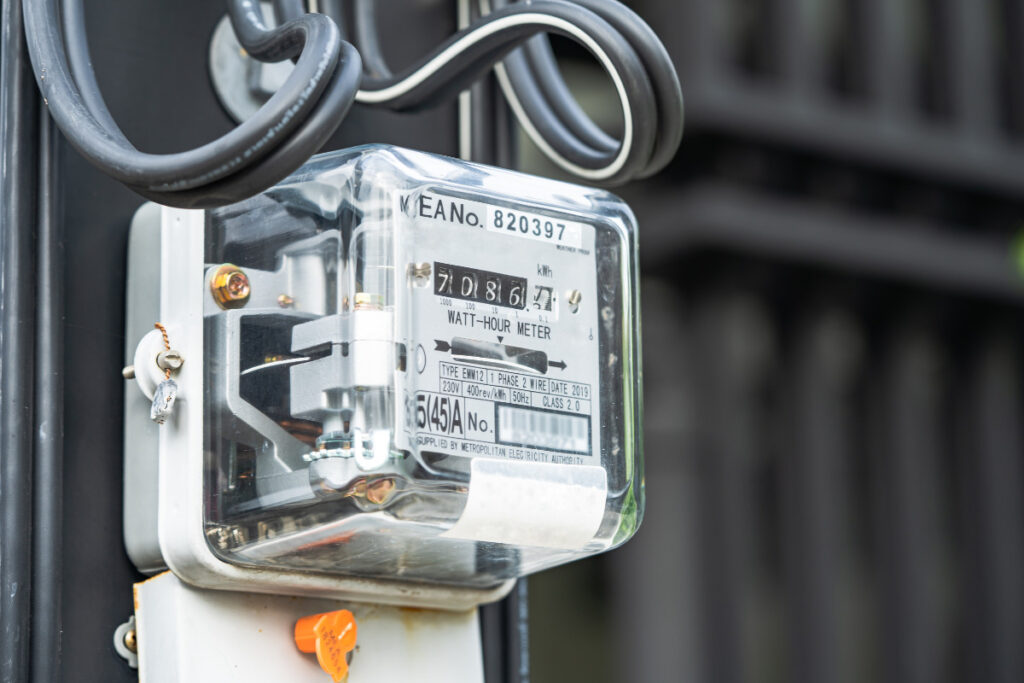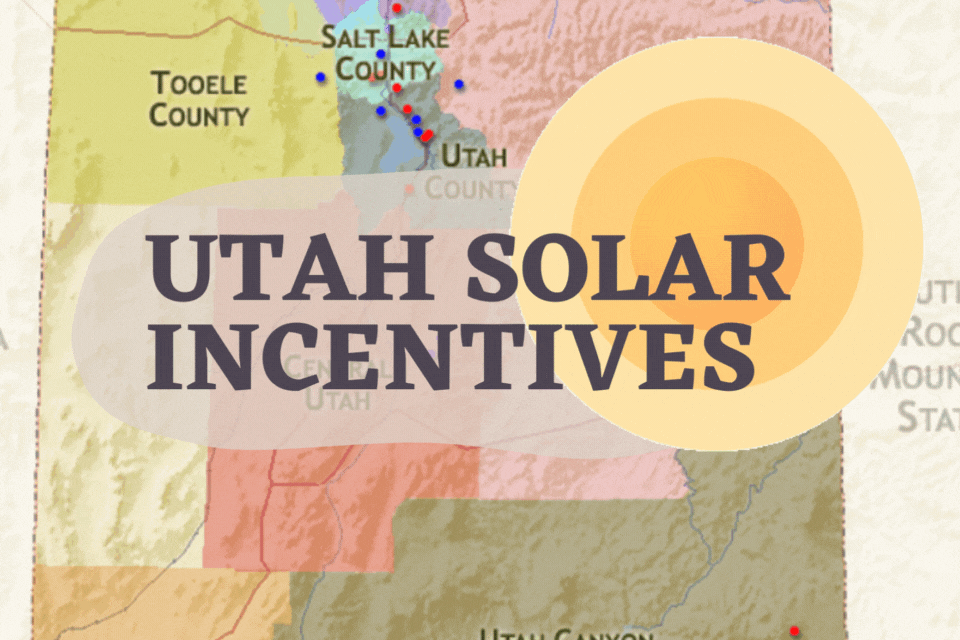Introduction
Thanks to its abundant sunshine and attractive solar incentives, Utah is becoming a hotspot for solar energy adoption. This rapidly growing interest in clean energy has resulted in significant savings for property owners and a more sustainable environment.
In this blog post, we will delve into the various Utah solar incentives available, from federal tax credits to local utility programs, that make transitioning to solar power both affordable and beneficial.
Understanding Utah Solar Incentives
Utah offers various solar incentives, including the Renewable Energy Systems Tax Credit, residential solar tax credit, federal tax credit, solar access rights, and Rocky Mountain Power solar incentives.
Renewable Energy Systems Tax Credit (RESTC)
Utah’s Renewable Energy Systems Tax Credit (RESTC) provides a significant financial incentive for residential and commercial property owners looking to invest in solar power.
For example, a homeowner purchases a solar system costing $20,000. With the RESTC in place, they would be eligible for a tax credit of up to $5,000 (25% of the total cost).
This substantial reduction can make all the difference when considering whether or not to install solar panels on your property. Along with this state-level tax credit, Utah residents can also take advantage of the generous Federal Investment Tax Credit (ITC), further increasing potential savings on their solar investment.
Residential Solar Tax Credit
As a property owner in Utah, you can also take advantage of the Residential Solar Tax Credit. This credit covers up to $2,000 or 25% of the total cost of your residential solar system, whichever is less.
To be eligible for this incentive program in Utah, you must own and use the home as your primary residence. The system must meet all requirements for installation and equipment performance standards set by the state’s Department of Environmental Quality (DEQ).
Taking advantage of federal and local incentives like these and Utah’s abundant sunshine and renewable energy resources throughout their lifetime reduce their carbon footprint while saving money on electricity bills.

Federal Tax Credit
Utah residents can also take advantage of the federal solar tax credit, which offers a dollar-for-dollar reduction in income tax liability based on 30% of the solar system installation cost.
This incentive is available for residential and commercial properties, making it an excellent opportunity for business owners to invest in clean energy while lowering their taxes.
The federal Investment Tax Credit has been extended through 2021, offering homeowners even more financial benefits when switching to solar energy. By combining this with Utah’s Renewable Energy Systems Tax Credit, property owners can save significant amounts on total system costs while enjoying the many benefits of renewable energy sources.
Solar Access Rights
Utah has laws protecting your right to access sunlight on your property. This means installing solar panels and generating electricity without being blocked by neighboring structures or trees.
The law also prevents homeowners associations from preventing you from installing solar panels as long as they meet specific guidelines.
Having solar access rights not only ensures that you can benefit fully from your investment in renewable energy. It also helps to promote a cleaner environment for all Utah residents.
By taking advantage of these incentives and rights, homeowners can reduce their carbon footprint while enjoying potential savings on energy costs over time.
Rocky Mountain Power Solar Incentives
Rocky Mountain Power is among the utility companies in Utah that provide solar incentives to property owners. The utility company offers net metering, which allows property owners with solar panels to send excess energy back into the grid and receive credits on their accounts.
Additionally, Rocky Mountain Power provides a rebate of $0.20 per watt for every kilowatt produced by the solar panel system, up to 25% of total project costs or $1,200, whichever comes first.

Benefits Of Utah Solar Incentives
Utah solar incentives offer numerous benefits such as lower energy costs, increased home value, positive environmental impact, access to federal solar tax credits and SRECs, property tax exemptions, and other financial incentives.
Lower Energy Costs
One of the most significant benefits of Utah solar incentives is lower energy costs. Property owners can significantly reduce their monthly electricity bills by installing a solar system.
With the Rocky Mountain Power Solar Incentives and Federal Tax Credit programs available in Utah, homeowners and businesses can save up to thousands of dollars on installation costs alone.
For example, let’s say you own a home that consumes 1,000 kilowatt-hours (kWh) per month with an average bill of $100. Installing a 5-kilowatt (kW) solar panel system will generate approximately 700 kWh per month, or about a 70% reduction in your monthly electric consumption from your utility company.
Increased Home Value
Investing in solar energy for your property not only lowers your energy costs but can also increase the value of your home. Solar panels are an attractive feature that potential buyers may be willing to pay more for, especially with the growing demand for environmentally friendly homes.
According to a report from the National Renewable Energy Laboratory, homes with solar panels sell 20% faster and at a premium price compared to non-solar homes. In addition, solar systems increase the efficiency and sustainability of your property, providing further financial benefits and making it more desirable on the market.
Environmental Impact
Choosing solar energy for your property is not just a smart financial move but also has a significant environmental impact. Using renewable energy, you are helping reduce the carbon footprint and greenhouse gas emissions contributing to climate change.
In addition to reducing your carbon footprint, installing solar panels on your property can also help improve air quality in your neighborhood. Traditional power plants rely on burning fossil fuels, leading to poor air quality and contributing significantly to health problems like asthma and lung disease.
By using solar panels to generate electricity, you’re contributing positively towards sustainable development by investing in renewable resources instead of non-renewable ones.
Federal Solar Tax Credit
Another incentive that property owners in Utah can take advantage of is the federal solar tax credit. This allows taxpayers to claim a credit of up to 26% on their federal income taxes for installing a solar system in their home or business.
For example, if you install a solar system for $20,000 on your property, you could claim a tax credit of up to $5,200 on your federal income taxes. It’s important to note that this is not just a deduction but a dollar-for-dollar reduction of your tax liability.
Solar Renewable Energy Credits (SRECs)
Solar Renewable Energy Credits (SRECs) allow Utah property owners to benefit financially from their solar panels. Simply put, SRECs represent the environmental benefits of generating renewable energy and can be sold on a market or traded.
In Utah, SRECs can offset solar panel installation costs or sell to others who need them to meet clean energy goals. One SREC is earned for every megawatt-hour of electricity a solar system generates, providing an additional incentive for those who invest in renewable energy.
Property Tax Exemptions
In addition to the various solar incentives available in Utah, property owners can benefit from tax exemptions for renewable energy systems. These exemptions apply to residential and commercial properties and can help lower the overall solar system cost.
Essentially, these exemptions reduce the property taxes owed on a property with added value due to a solar installation. For instance, if an individual install a $20,000 solar system that increases their home’s value by $15,000, they would only be taxed on the original value rather than the increased value with the new installation.

How To Qualify For Utah Solar Incentives
To qualify for Utah solar incentives, specific steps must be followed. This includes understanding eligibility requirements and finding a qualified solar installer. Proper completion of the application and tax credit claims are also crucial.
Eligibility Requirements
To qualify for Utah solar incentives, homeowners must meet certain eligibility requirements. For instance, the homeowner must own the property and have a good credit score.
Additionally, their roof should receive direct sunlight for most days without shading from trees or structures.
Qualification requirements vary based on the type of Utah incentive applied for. For instance, some incentives are specific to commercial properties, while others use only for residential homes.
Requirements For Installation
To qualify for solar incentives in Utah, there are specific requirements property owners must meet to ensure a safe and efficient installation. The first requirement is that the system should be installed by a qualified solar installer.
The second requirement is ensuring sufficient roof space or land area. Solar panels require adequate exposure to sunlight, and the installer will assess your location’s suitability for installation during a site visit.
Finally, qualifying systems must meet specific equipment requirements.
Property owners can install safe and efficient solar systems by meeting these requirements while maximizing their potential benefits from available incentives in Utah.
How To Find A Qualified Solar Installer
Finding a qualified solar installer is crucial for getting the most out of your Utah solar incentives. Research online and ask for recommendations from friends or family who have installed solar panels.
Look for licensed and insured installers with years of experience and good reviews from previous customers. You can also check with local trade organizations such as Solar Energy Industries Association (SEIA) to find reputable installers in your area.
Before signing any contracts, ensure you understand all the installation requirements and costs associated with your system to get the best value for your investment.
Application Process
Property owners should first ensure that they meet eligibility requirements to qualify for Utah solar incentives. They can find a qualified solar installer by consulting the Utah Solar Energy Association or online resources such as DroneQuote.
Once a system has been installed, application forms must be completed and submitted to the appropriate agency. You must attach supporting documentation such as proof of installation and purchase receipts.
Property owners should also remember that claiming tax credits comes after installation. You must have enough income tax liability to benefit from federal tax credits. Or sell unused credits through SREC markets.
Additionally, for those unable to install solar systems, community solar programs provide an option to support clean energy initiatives.
Claiming Tax Credits
Property owners must complete the necessary paperwork to claim Utah solar incentives and submit it to the appropriate agencies. For the Renewable Energy Systems Tax Credit, homeowners can file a Utah State form TC-40R with their income tax return.
It’s important to keep all installation and equipment purchase receipts as proof of eligibility.
Claiming these tax credits may seem daunting, but they’re worth it in terms of cost savings and environmental benefits. For example, if a homeowner spends $15,000 on a solar system installation that qualifies them for a $4,500 state tax credit and $4,500 federal tax credit, they can recover 60% of their investment in just one year through energy savings alone.

Is Utah Solar Worth It?
Utah solar incentives offer a compelling case for homeowners and businesses to invest in solar energy. Benefits include lower energy costs, increased home value, and environmental advantages. Tax credits and property tax exemptions add to the appeal.
Cost Savings
One of the most significant benefits of investing in solar energy is its substantial cost savings. Using Utah solar incentives allows property owners to reduce their electricity bills and save money on energy costs over time.
Utah’s net metering program also enables homeowners to sell excess energy to their utility company. This helps reduce overall costs. Homeowners can earn credits for excess electricity produced during peak hours. These credits are applied toward future usage charges.
Environmental Benefits
Going solar in Utah doesn’t just mean lower energy costs and financial incentives; it also has significant environmental benefits. Switching to solar power reduces carbon footprint and dependence on fossil fuels. Installing a solar system saves thousands of pounds of CO2 emissions annually. This equals planting hundreds of trees or removing multiple cars from the road.
Not only do these actions benefit our planet, but they also help protect the environment for future generations.
Long-Term Investment
Investing in solar energy is a long-term commitment that can yield significant returns for property owners. In addition to the immediate cost savings on utility bills, residential and commercial solar systems add value to properties over time, increasing home values and boosting business profits.
The Federal Investment Tax Credit offers a 30% reduction in installation costs, further enhancing the cost-effectiveness of solar investments.
According to research by the National Renewable Energy Laboratory (NREL), homes with rooftop solar panel systems sell 20% faster than those without. Furthermore, these homes sell for higher prices than comparable non-solar homes – an average premium of $3.78 per watt or $15,000 for a typical 4 kW system.
Businesses benefit from solar power by reducing costs, freeing up capital, and demonstrating social responsibility with reduced carbon emissions.

Making The Most Of Utah Solar Incentives
To make the most of Utah’s solar incentives, it’s important to start by understanding what’s available. Homeowners and businesses can save money with various renewable energy incentives like tax credits and exemptions.
Cost savings is one of the most significant benefits of taking advantage of Utah’s solar incentives. If you reduce your reliance on traditional power sources, you can lower your monthly energy bills. It will also increase your property’s value. Additionally, using clean energy helps reduce environmental impact and combat climate change.
Conclusion
In conclusion, investing in solar energy in Utah is a smart decision for property owners. Utah’s incentives and tax credits reduce installation and energy costs. Homeowners save on monthly utility bills while promoting a cleaner environment. Additionally, installing solar panels can increase the value of your home or business, making it an excellent long-term investment.
FAQs
- What types of solar incentives are available in Utah?
Utah offers state and federal tax credits for residential and commercial solar energy systems. This program allows utility customers to earn credits on their bills for excess energy generated by their system. Net metering programs are also available.
- Who is eligible for Utah’s solar incentives?
Homeowners, businesses, non-profits, and even government agencies can all take advantage of the state’s solar incentives if they install a qualifying solar panel array or other renewable energy systems.
- How much will I save with Utah’s solar incentives?
The amount you can save depends on factors like the installation size, the equipment used, and how much sun exposure your property gets throughout the year. However, most homeowners can expect significant savings on their monthly power bills over time.
- Do I need a professional installer to qualify for Utah’s incentives?
To qualify for financial benefits, working with a licensed contractor is advisable. Look for a contractor who specializes in renewable energy installations. Ensure compliance with building codes and safety regulations. Also, check for local authority requirements.

